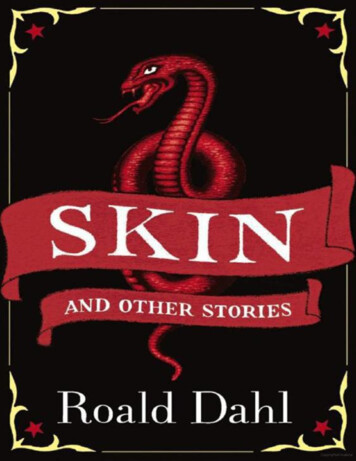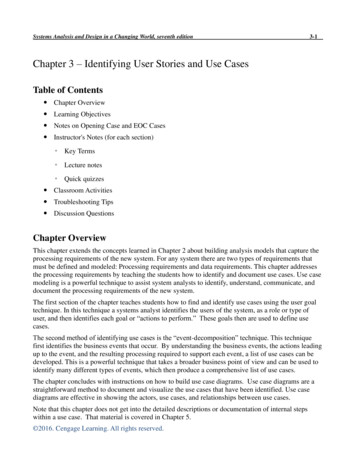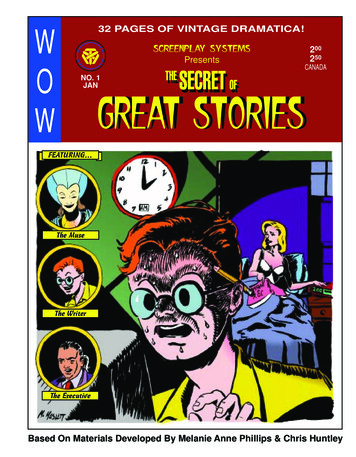
Transcription
1Rashomon, and Other StoriesRyunosuke Akutagawa***PrefaceIntroductionRashomon and Other Stories* In a Grove* The Testimony of a Woodcutter Questioned by a High Police Commissioner* The Testimony of a Traveling Buddhist Priest Questioned by a High Police Commissioner* The Testimony of a Policeman Questioned by a High Police Commissioner* The Testimony of an Old Woman Questioned by a High Police Commissioner* The Confession of a Woman Who Has Come to the Shimizu Temple* The Story of the Murdered Man, as Told Through a Medium
Part I2Yam GruelThe Martyr* PostscriptKesa and Morito*Part I* Morito's Monologue*Part II* Kesa's MonologueThe Dragon***PREFACETHE SIX STORIES of this collection were chosen with the aim of presenting Akutagawa's finest and mostrepresentative writings. Only one of them (Rashomon) has appeared in an earlier translation.I wish to express my thanks to the following persons, for their kind assistance, and for their many valuablesuggestions and criticisms: Mr. C. G. Wells, Chief Writer of the Far East Network; Mr. Walter E. Morgan,Chief of the School Administration and Finance Branch, CIE, SCAP; Mr. Harold Gosling and Mr. JohnRockard, correspondents of the British Commonwealth Public Relations; Mr. Richard B. Farnsworth,formerly of CIE, SCAP; and Lieutenant D. L. Donohugh, formerly of the Press Advisory Division, SCAP.Takashi Kojima Tokyo, Japan.INTRODUCTIONTO SKETCH THE background and temperament of Akutagawa Ryu nosuke is to risk a melancholy clich.He was brilliant, sensitive, cynical, neurotic; he lived in Tokyo, went to the University, taught briefly, andjoined the literary staff of a newspaper. Even his early suicide (in 1927, at thirty five) only heightens theportrait of a modern Japanese intellectual, the double victim of an unsympathetic society and a split culture.But it is a vague composite portrait. For Akutagawa himself, aloof, elusive, individual, remains withdrawnbehind the polished faade of his collected works. All that needs to be known about their author, besides thename stamped on the binding, may be found within these poems, essays, miscellaneous writings, and morethan a hundred beautifully finished stories.The stories have a dazzling and perhaps deceptive sheen. Superficial critics called Akutagawa precious, ordecadent, or dismissed him as a fatiguingly clever dilettante. Unprepared for the strength of his later satires,they supposed him to care only for the superb texture of his prose. Translation protects us from the seductions
Part I3of this style, yet encourages a similar error, since the nuances of Akutagawa's prose are what conveys theessence of his thought. Like Natsume So seki and Hori Oøgai, whom he admired, Akutagawa used hislanguage delicately, precisely, and with a richness enhanced by a knowledge of several literatures. It issignificant that his first published writings were translations of Yeats and Anatole France. He remarked oncethat words must yield more than the bare dictionary meanings; he had a poet's feeling for their shapes andflavors, as well as their ambiguities, and he combined them with such freshness and economy that hisphrasing never lacks distinction. Like Picasso, Akutagawa often varied his style, but always, whatever theparticular blend of vernacular and mandarin, he controlled it with scrupulous precision. A master of tone, hegave his stories a cool classic surface, colored but never marred by the wit and warmth underlying that perfectglaze. The composure of his style is undisturbed even by vivid accents of the sordid or the bizarre.Detachment was a key strategy to Akutagawa. As a narrator, he liked to be unseen, impersonal; he cultivatedthe oblique glance. When he did enter his stories, it was usually in the slight role of the observer or the suaveself effacing compiler. Old tales and legends, historical settings of the remote Heian Period or the feudal ageswhich followed Ñthese he used not to turn his elaborate erudition to account, but to enrich and extend theimplications of his themes, and to maintain aesthetic distance. The early era of Christian conversion in Japan,in the sixteenth century, was a favorite of his; in Hoøkyoønin no shi (The Martyr) he exploited it to the pointof hoax by supporting an archaic style with a source reference which, after an interval for learned controversy,he acknowledged to be fictitious. It suited his ironic taste to play the illusionist who leaves his audiencestaring blankly into a mirror.But Akutagawa did more than deceive scholars and baffle the unwary: he antagonized ruling critical opinion.His attention to style, his preference for techniques of indirection and restraint, his indifference to currentdogma Ñ such attitudes were heresy to both the leading literary schools. The Proletarian writers, flourishing inthe '20's, found nothing in common between Akutagawa's subtle stories and their own carefully chosen butgrossly cut slices of life. The Naturalists, their rivals, had moved toward romantic individualism, forgettingZola's concept of social inquiry. Dominant since the Russo Japanese War, they sanctioned only the literarymethod to which, in the name of the first person singular shishoøsetsu, their successors still adhere. This wasthe Confession, ranging from the sentimental memoir to the clinical report of an author's sexual life. Despitethe exhaustion of the autobiographical form of fiction after Proust, these novelists went on eagerly probingtheir wounds and laying themselves open to reproach; while Akutagawa, unmoved by the exhibition of somany tedious egos, went his own way. A few of his stories suggest maliciously that confession itself may befalse. Yabu no naka (In a Grove), for example, converts an old melodramatic tale into a series of conflictingstatements which undermine our prosaic confidence in distinguishing between subjective and objective, truthand fiction. Even the dark testaments which he left before suicide contain flashes of mockery to perplex thestraightforward reader.There are enough Swiftian touches in Akutagawa to show his hatred of stupidity, greed, hypocrisy, and therising jingoism of the day. But Akutagawa's artistic integrity kept him from joining his contemporaries in easysocial criticism or naive introspection. If, too often, his finely enameled miniatures seem cold,over subtilized, worn thin by an obsessive critical sense, still they are never merely decorative. What he didwas to question the values of his society, dramatize the complexities of human psychology, and study, with aZen taste for paradox, the precarious balance of illusion and reality. He developed a variety of techniques Ñfrom realism to fantasy, symbolism to surrealism Ñ and used all of them in the search for poetic truth.Akutagawa was both intellectual and artist, and it was the quality of his artistry that enabled him to explorethese difficult problems as deeply as he did, and to give his perceptions such exquisite and durable form.Howard Hibbett Tokyo, Japan***RASHOMON AND OTHER STORIES
Part I4IN A GROVETHE TESTIMONY OF A WOODCUTTER QUESTIONED BY A HIGH POLICE COMMISSIONERYES, SIR. Certainly, it was I who found the body. This morning, as usual, I went to cut my daily quota ofcedars, when I found the body in a grove in a hollow in the mountains. The exact location? About 150 metersoff the Yamashina stage road. It's an out of the way grove of bamboo and cedars.The body was lying flat on its back dressed in a bluish silk kimono and a wrinkled head dress of the Kyotostyle. A single sword stroke had pierced the breast. The fallen bamboo blades around it were stained withbloody blossoms. No, the blood was no longer running. The wound had dried up, I believe. And also, agad fly was stuck fast there, hardly noticing my footsteps.You ask me if I saw a sword or any such thing? No, nothing, sir. I found only a rope at the root of a cedar nearby. And. well, in addition to a rope, I found a comb. That was all. Apparently he must have made a battle ofit before he was murdered, because the grass and fallen bamboo blades had been trampled down all around."A horse was near by?"No, sir. It's hard enough for a man to enter, let alone a horse.THE TESTIMONY OF A TRAVELING BUDDHIST PRIEST QUESTIONED BY A HIGH POLICECOMMISSIONERThe time? Certainly, it was about noon yesterday, sir. The unfortunate man was on the road from Sekiyama toYamashina. He was walking toward Sekiyama with a woman accompanying him on horseback, who I havesince learned was his wife. A scarf hanging from her head hid her face from view. All I saw was the color ofher clothes, a lilac colored suit. Her horse was a sorrel with a fine mane. The lady's height? Oh, about fourfeet five inches. Since I am a Buddhist priest, I took little notice about her details. Well, the man was armedwith a sword as well as a bow and arrows. And I remember that he carried some twenty odd arrows in hisquiver.Little did I expect that he would meet such a fate. Truly human life is as evanescent as the morning dew or aflash of lightning. My words are inadequate to express my sympathy for him.THE TESTIMONY OF A POLICEMAN QUESTIONED BY A HIGH POLICE COMMISSIONERThe man that I arrested? He is a notorious brigand called Tajomaru. When I arrested him, he had fallen off hishorse. He was groaning on the bridge at Awataguchi. The time? It was in the early hours of last night. For therecord, I might say that the other day I tried to arrest him, but unfortunately he escaped. He was wearing adark blue silk kimono and a large plain sword. And, as you see, he got a bow and arrows somewhere. You saythat this bow and these arrows look like the ones owned by the dead man? Then Tajomaru must be themurderer. The bow wound with leather strips, the black lacquered quiver, the seventeen arrows with hawkfeathers Ñ these were all in his possession I believe. Yess sir, the horse is, as you say, a sorrel with a finemane. A little beyond the stone bridge I found the horse grazing by the roadside, with his long rein dangling.Surely there is some providence in his having been thrown by the horse.Of all the robbers prowling around Kyoto, this Tajomaru has given the most grief to the women in town. Lastautumn a wife who came to the mountain back of the Pindora of the Toribe Temple, presumably to pay a visit,was murdered, along with a girl. It has been suspected that it was his doing. If this criminal murdered the man,you cannot tell what he may have done with the man's wife. May it please your honor to look into thisproblem as well.
Part I5THE TESTIMONY OF AN OLD WOMAN QUESTIONED BY A HIGH POLICE COMMISSIONERYes, sir, that corpse is the man who married my daughter. He does not come from Kyoto. He was a samurai inthe town of Kokufu in the province of Wakasa. His name was Kanazawa no Takehiko, and his age wastwenty six. He was of a gentle disposition, so I am sure he did nothing to provoke the anger of others.My daughter? Her name is Masago, and her age is nineteen. She is a spirited, fun loving girl, but I am sureshe has never known any man except Takehiko. She has a small, oval, dark complected face with a mole atthe corner of her left eye.Yesterday Takehiko left for Wakasa with my daughter. What bad luck it is that things should have come tosuch a sad end! What has become of my daughter? I am resigned to giving up my sonin law as lost, but thefate of my daughter worries me sick. For heaven's sake leave no stone unturned to find her. I hate that robberTajomaru, or whatever his name is. Not only my son in law, but my daughter. (Her later words weredrowned in tears.)I killed him, but not her. Where's she gone? I can't tell. Oh, wait a minute. No torture can make me confesswhat I don't know. Now things have come to such a head, I won't keep anything from you.Yesterday a little past noon I met that couple. Just then a puff of wind blew, and raised her hanging scarf, sothat I caught a glimpse of her face. Instantly it was again covered from my view. That may have been onereason; she looked like a Bodhisattva. At that moment I made up my mind to capture her even if I had to killher man.Why? To me killing isn't a matter of such great consequence as you might think. When a woman is captured,her man has to be killed anyway. In killing, I use the sword I wear at my side. Am I the only one who killspeople? You, you don't use your swords. You kill people with your power, with your money. Sometimes youkill them on the pretext of working for their good. It's true they don't bleed. They are in the best of health, butall the same you've killed them. It's hard to say who is a greater sinner, you or me. (An ironical smile.)But it would be good if I could capture a woman without killing her man. So, I made up my mind to captureher, and do my best not to kill him. But it's out of the question on the Yamashina stage road. So I managed tolure the couple into the mountains.It was quite easy. I became their traveling companion, and I told them there was an old mound in themountain over there, and that I had dug it open and found many mirrors and swords. I went on to tell them I'dburied the things in a grove behind the mountain, and that I'd like to sell them at a low price to anyone whowould care to have them. Then. you see, isn't greed terrible? He was beginning to be moved by my talkbefore he knew it. In less than half an hour they were driving their horse toward the mountain with me.When he came in front of the grove, I told them that the treasures were buried in it, and I asked them to comeand see. The man had no objectionÑhe was blinded by greed. The woman said she would wait on horseback.It was natural for her to say so, at the sight of a thick grove. To tell you the truth, my plan worked just as Iwished, so I went into the grove with him, leaving her behind alone. The grove is only bamboo for somedistance. About fifty yards ahead there's a rather open clump of cedars. It was a convenient spot for mypurpose. Pushing my way through the grove, I told him a plausible lie that the treasures were buried under thecedars. When I told him this, he pushed his laborious way toward the slender cedar visible through the grove.After a while the bamboo thinned out, and we came to where a number of cedars grew in a row. As soon aswe got there, I seized him from behind. Because he was a trained, sword bearing warrior, he was quite strong,but he was taken by surprise, so there was no help for him. I soon tied him up to the root of a cedar. Where didI get a rope? Thank heaven, being a robber, I had a rope with me, since I might have to scale a wall at anymoment. Of course it was easy to stop him from calling out by gagging his mouth with fallen bamboo leaves.
Part I6When I disposed of him, I went to his woman and asked her to come and see him, because he seemed to havebeen suddenly taken sick. It's needless to say that this plan also worked well. The woman, her sedge hat off,came into the depths of the grove, where I led her by the hand. The instant she caught sight of her husband,she drew a small sword. I've never seen a woman of such violent temper. If I'd been off guard, I'd have got athrust in my side. I dodged, but she kept on slashing at me. She might have wounded me deeply or killed me.But I'm Tajomaru. I managed to strike down her small sword without drawing my own. The most spiritedwoman is defenseless without a weapon. At last I could satisfy my desire for her without taking her husband'slife.Yes,. without taking his life. I had no wish to kill him. I was about to run away from the grove, leaving thewoman behind in tears, when she frantically clung to my arm. In broken fragments of words, she asked thateither her husband or I die. She said it was more trying than death to have her shame known to two men. Shegasped out that she wanted to be the wife of whichever survived. Then a furious desire to kill him seized me.(Gloomy excitement.)Telling you in this way, no doubt I seem a crueler man than you. But that's because you didn't see her face.Especially her burning eyes at that moment. As I saw her eye to eye, I wanted to make her my wife even if Iwere to be struck by lightning. I wanted to make her my wife. this single desire filled my mind. This was notonly lust, as you might think. At that time if I'd had no other desire than lust, I'd surely not have mindedknocking her down and running away. Then I wouldn't have stained my sword with his blood. But themoment I gazed at her face in the dark grove, I decided not to leave there without killing him.But I didn't like to resort to unfair means to kill him. I untied him and told him to cross swords with me. (Therope that was found at the root of the cedar is the rope I dropped at the time.) Furious with anger, he drew histhick sword. And quick as thought, he sprang at me ferociously, without speaking a word. I needn't tell youhow our fight turned out. The twenty third stroke. please remember this. I'm impressed with this fact still.Nobody under the sun has ever clashed swords with me twenty strokes. (A cheerful smile.)When he fell, I turned toward her, lowering my blood stained sword. But to my great astonishment she wasgone. I wondered to where she had run away. I looked for her in the clump of cedars. I listened, but heard onlya groaning sound from the throat of the dying man.As soon as we started to cross swords, she may have run away through the grove to call for help. When Ithought of that, I decided it was a matter of life and death to me. So, robbing him of his sword, and bow andarrows, I ran out to the mountain road. There I found her horse still grazing quietly. It would be a mere wastewords to tell you the later details, but before I entered town I had already parted with the sword. That's all myconfession. I know that my head will be hung in chains anyway, so put me down for the maximum penalty. (Adefiant attitude.)THE CONFESSION OF A WOMAN WHO HAS COME TO THE SHIMIZU TEMPLEThat man in the blue silk kimono, after forcing me to yield to him, laughed mockingly as he looked at mybound husband. How horrified my husband must have been! But no matter how hard he struggled in agony,the rope cut into him all the more tightly. In spite of myself I ran stumblingly toward his side. Or rather I triedto run toward him, but the man instantly knocked me down. Just at that moment I saw an indescribable lightin my husband's eyes. Something beyond expression. his eyes make me shudder even now. Thatinstantaneous look of my husband, who couldn't speak a word, told me all his heart. The flash in his eyes wasneither anger nor sorrow. only a cold light, a look of loathing. More struck by the look in his eyes than by theblow of the thief, I called out in spite of myself and fell unconscious.In the course of time I came to, and found that the man in blue silk was gone. I saw only my husband stillbound to the root of the cedar. I raised myself from the bamboo blades with difficulty, and looked into his
Part I7face; but the expression in his eyes was just the same as before.Beneath the cold contempt in his eyes, there was hatred. Shame, grief, and anger. I don't know how toexpress my heart at that time. Reeling to my feet, I went up to my husband."Takejiro," I said to him, "since things have come to this pass, I cannot live with you. I'm determined to die,.but you must die, too. You saw my shame. I can't leave you alive as you are."This was all I could say. Still he went on gazing at me with loathing and contempt. My heart breaking, Ilooked for his sword. It must have been taken by the robber. Neither his sword nor his bow and arrows wereto be seen in the grove. But fortunately my small sword was lying at my feet. Raising it over head, once moreI said, "Now give me your life. I'll follow you right away."When he heard these words, he moved his lips with difficulty. Since his mouth was stuffed with leaves, ofcourse his voice could not be heard at all. But at a glance I understood his words. Despising me, his look saidonly, "Kill me." Neither conscious nor unconscious, I stabbed the small sword through the lilac coloredkimono into his breast.Again at this time I must have fainted. By the time I managed to look up, he had already breathed his last Ñstill in bonds. A streak of sinking sunlight streamed through the clump of cedars and bamboos, and shone onhis pale face. Gulping down my sobs, I untied the rope from his dead body. And. and what has become of mesince I have no more strength to tell you. Anyway I hadn't the strength to die. I stabbed my own throat withthe small sword, I threw myself into a pond at the foot of the mountain, and I tried to kill myself in manyways. Unable to end my life, I am still living in dishonor. (A lonely smile.) Worthless as I am, I must havebeen forsaken even by the most merciful Kwannon. I killed my own husband. I was violated by the robber.Whatever can I do? Whatever can I. I. (Gradually, violent sobbing.)THE STORY OF THE MURDERED MAN, AS TOLD THROUGH A MEDIUMAfter violating my wife, the robber, sitting there, began to speak comforting words to her. Of course I couldn'tspeak. My whole body was tied fast to the root of a cedar. But meanwhile I winked at her many times, asmuch as to say "Don't believe the robber". I wanted to convey some such meaning to her. But my wife, sittingdejectedly on the bamboo leaves, was looking hard at her lap. To all appearance, she was listening to hiswords. I was agonized by jealousy. In the meantime the robber went on with his clever talk, from one subjectto another. The robber finally made his bold, brazen proposal. "Once your virtue is stained, you won't getalong well with your husband, so won't you be my wife instead? It's my love for you that made me be violenttoward you."While the criminal talked, my wife raised her face as if in a trance. She had never looked so beautiful as atthat moment. What did my beautiful wife say in answer to him while I was sitting bound there? I am lost inspace, but I have never thought of her answer without burning with anger and jealousy. Truly she said,."Then take me away with you wherever you go."This is not the whole of her sin. If that were all, I would not be tormented so much in the dark. When she wasgoing out of the grove as if in a dream, her hand in the robber's, she suddenly turned pale, and pointed at metied to the root of the cedar, and said, "Kill him! I cannot marry you as long as he lives.""Kill him!" she criedmany times, as if she had gone crazy. Even now these words threaten to blow me headlong into the bottomlessabyss of darkness. Has such a hateful thing come out of a human mouth ever before? Have such cursed wordsever struck a human ear, even once? Even once such a. (A sudden cry of scorn.) At these words the robberhimself turned pale. "Kill him," she cried, clinging to his arms. Looking hard at her, he answered neither yesnor no. but hardly had I thought about his answer before she had been knocked down into the bambooleaves. (Again a cry of scorn.) Quietly folding his arms, he looked at me and said, "What will you do with
Part I8her? Kill her or save her? You have only to nod. Kill her?" For these words alone I would like to pardon hiscrime.While I hesitated, she shrieked and ran into the depths of the grove. The robber instantly snatched at her, buthe failed even to grasp her sleeve.After she ran away, he took up my sword, and my bow and arrows. With a single stroke he cut one of mybonds. I remember his mumbling, "My fate is next." Then he disappeared from the grove. All was silent afterthat. No, I heard someone crying. Untying the rest of my bonds, I listened carefully, and I noticed that it wasmy own crying. (Long silence.)I raised my exhausted body from the root of the cedar. In front of me there was shining the small sword whichmy wife had dropped. I took it up and stabbed it into my breast. A bloody lump rose to my mouth, but I didn'tfeel any pain. When my breast grew cold, everything was as silent as the dead in their graves. What profoundsilence! Not a single bird note was heard in the sky over this grave in the hollow of the mountains. Only alonely light lingered on the cedars and mountain. By and by the light gradually grew fainter, till the cedars andbamboo were lost to view. Lying there, I was enveloped in deep silence.Then someone crept up to me. I tried to see who it was. But darkness had already been gathering round me.Someone. that someone drew the small sword softly out of my breast in its invisible hand. At the same timeonce more blood flowed into my mouth. And once and for all I sank down into the darkness of space.RASHOMON[The "Rashoømon" was the largest gate in Kyoto, the ancient capital of Japan. It was 106 feet wide and 26feet deep, and was topped with a ridge pole; its stone wall rose 75 feet high. This gate was constructed in789 when the then capital of Japan was transferred to Kyoto. With the decline of West Kyoto, the gate fellinto bad repair, cracking and crumbling in many places, and became a hide out for thieves and robbers and aplace for abandoning unclaimed corpses.]IT WAS A chilly evening. A servant of a samurai stood under the Rashoømon, waiting for a break in the rain.No one else was under the wide gate. On the thick column, its crimson lacquer rubbed off here and there,perched a cricket. Since the Rashoømon stands on Sujaku Avenue, a few other people at least, in sedge hat ornobleman's headgear, might have been expected to be waiting there for a break in the rain storm. But no onewas near except this man.For the past few years the city of Kyoøto had been visited by a series of calamities, earthquakes, whirlwinds,and fires, and Kyoøto had been greatly devastated. Old chronicles say that broken pieces of Buddhist imagesand other Buddhist objects, with their lacquer, gold, or silver leaf worn off, were heaped up on roadsides to besold as firewood. Such being the state of affairs in Kyoøto, the repair of the Rashoømon was out of thequestion. Taking advantage of the devastation, foxes and other wild animals made their dens in the ruins ofthe gate, and thieves and robbers found a home there too. Eventually it became customary to bring unclaimedcorpses to this gate and abandon them. After dark it was so ghostly that no one dared approach.Flocks of crows flew in from somewhere. During the daytime these cawing birds circled round the ridgepoleof the gate. When the sky overhead turned red in the afterlight of the departed sun, they looked like so manygrains of sesame flung across the gate. But on that day not a crow was to be seen, perhaps because of thelateness of the hour. Here and there the stone steps, beginning to crumble, and with rank grass growing intheir crevices, were dotted with the white droppings of crows. The servant, in a worn blue kimono, sat on theseventh and highest step, vacantly watching the rain. His attention was drawn to a large pimple irritating hisright cheek.
Part I9As has been said, the servant was waiting for a break in the rain. But he had no particular idea of what to doafter the rain stopped. Ordinarily, of course, he would have returned to his master's house, but he had beendischarged just before. The prosperity of the city of Kyoøto had been rapidly declining, and he had beendismissed by his master, whom he had served many years, because of the effects of this decline. Thus,confined by the rain, he was at a loss to know where to go. And the weather had not a little to do with hisdepressed mood. The rain seemed unlikely to stop. He was lost in thoughts of how to make his livingtomorrow, helpless incoherent thoughts protesting an inexorable fate. Aimlessly he had been listening to thepattering of the rain on the Sujaku Avenue.The rain, enveloping the Rashoømon, gathered strength and came down with a pelting sound that could beheard far away. Looking up, he saw a fat black cloud impale itself on the tips of the tiles jutting out from theroof of the gate.He had little choice of means, whether fair or foul, because of his helpless circumstances. If he chose honestmeans, he would undoubtedly starve to death beside the wall or in the Sujaku gutter. He would be brought tothis gate and thrown away like a stray dog. If he decided to steal. His mind, after making the same detourtime and again, came finally to the conclusion that he would be a thief.But doubts returned many times. Though determined that he had no choice, he was still unable to musterenough courage to justify the conclusion that he must become a thief.After a loud fit of sneezing he got up slowly. The evening chill of Kyoøto made him long for the warmth of abrazier. The wind in the evening dusk howled through the columns of the gate. The cricket which had beenperched on the crimsonlacquered column was already gone.Ducking his neck, he looked around the gate, and drew up the shoulders of the blue kimono which he woreover his thin underwear. He decided to spend the night there, if he could find a secluded corner sheltered fromwind and rain. He found a broad lacquered stairway leading to the tower over the gate. No one would be there,except the dead, if there were any. So, taking care that the sword at his side did not slip out of the scabbard, heset foot on the lowest step of the stairs.A few seconds later, halfway up the stairs, he saw a movement above. Holding his breath and huddlingcat like in the middle of the broad stairs leading to the tower, he watched and waited. A light coming fromthe upper part of the tower shone faintly upon his right cheek. It was the cheek with the red, festering pimplevisible under his stubbly whiskers. He had expected only dead people inside the tower, but he had only goneup a few steps before he noticed a fire above, about which someone was moving. He saw a dull, yellow,flickering light which made the cobwebs hanging from the ceiling glow in a ghostly way. What sort of personwould be maki
Rashomon, and Other Stories Ryunosuke Akutagawa * * * Preface Introduction Rashomon and Oth











